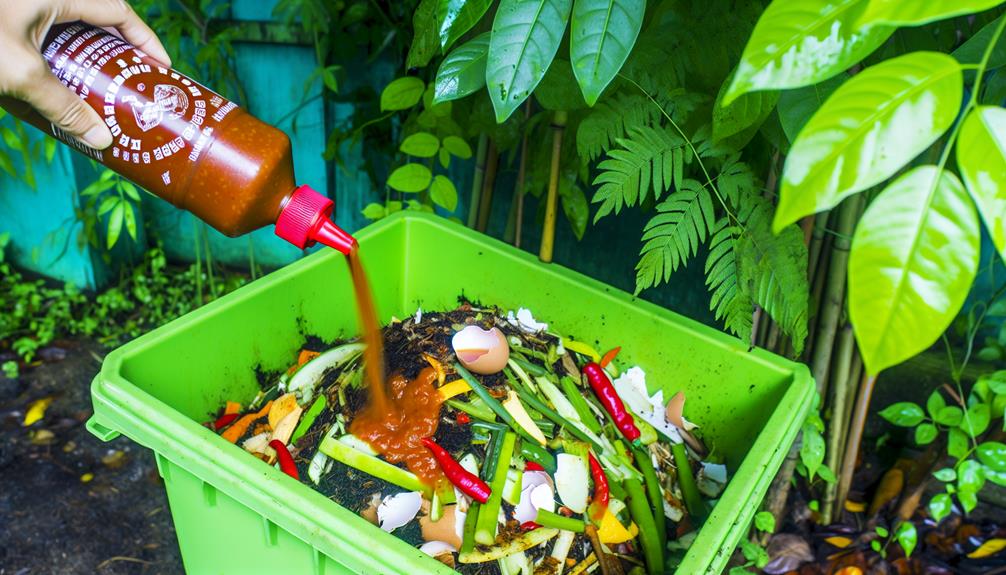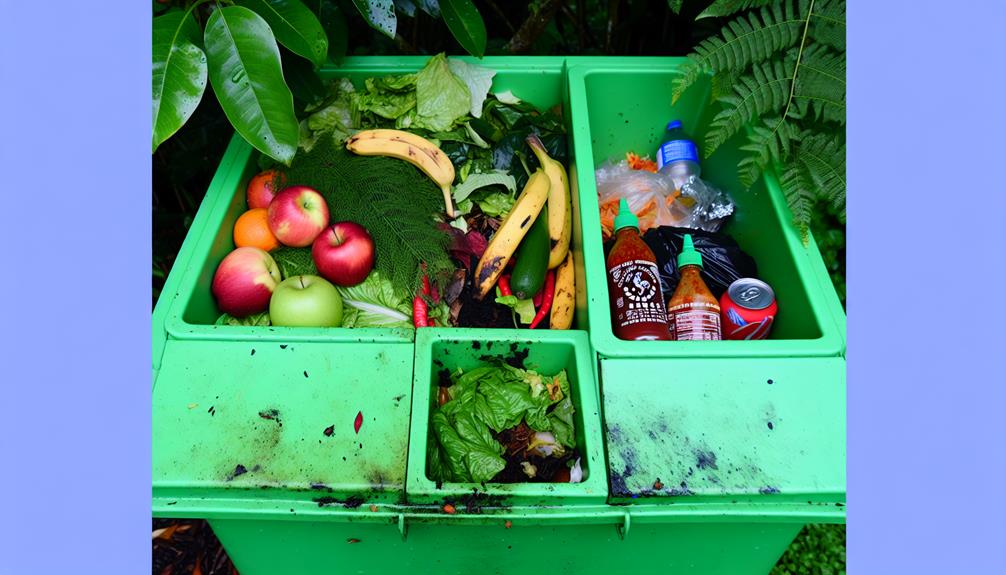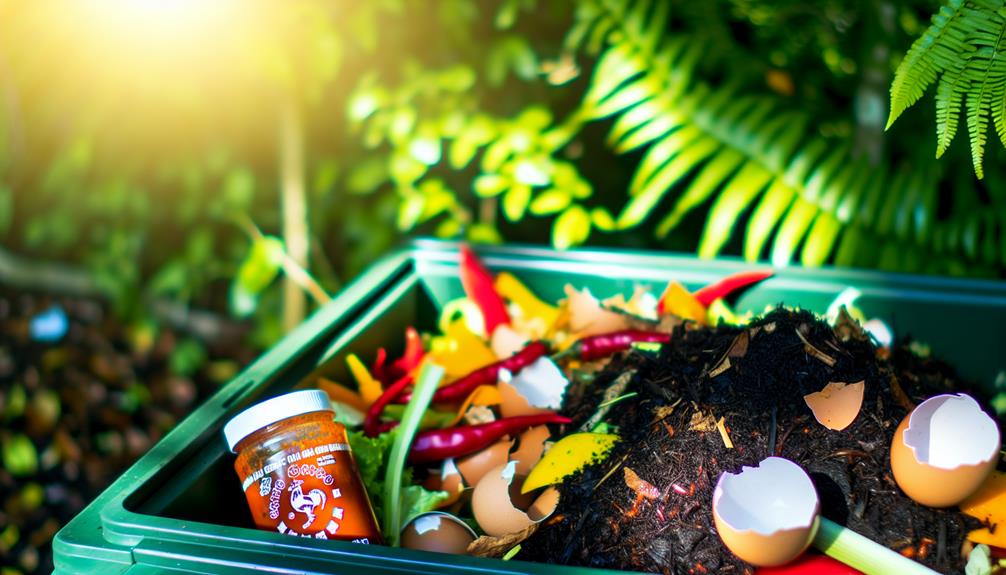

Yes, you can compost Sriracha sauce, but you need to manage its acidity and spiciness. Sriracha contains chili peppers, vinegar, garlic, sugar, and salt, which can affect your compost’s balance. The acidity from the vinegar and capsaicin from the chili peppers may disrupt the composting process.
To compost Sriracha safely, dilute it with water and mix it with plenty of brown materials like dry leaves or cardboard to neutralize its effects. This helps maintain a balanced pH level. If done correctly, you’ll minimize negative impacts and enhance your compost’s nutrient profile. For more insights on effective composting practices, continue exploring.
Composting is a natural process that turns organic waste into valuable soil nutrients. If you’re new to composting, understanding the basics can make a big difference.
First, let’s talk about compost bins. These are essential tools that help you manage and contain your compost pile. You can choose from various types like tumblers, stationary bins, or even homemade ones. Each offers different benefits, so pick one that fits your space and needs.
Next, consider the composting methods. There are several you can use, such as hot composting, cold composting, and vermicomposting. Hot composting requires more attention but produces compost quickly. It involves maintaining a balance of green (nitrogen-rich) and brown (carbon-rich) materials and regularly turning the pile to keep it aerated.
Cold composting is simpler but slower, ideal if you’re not in a rush. Just add your organic waste to the bin and let nature do its work. Vermicomposting, on the other hand, uses worms to break down food scraps, producing nutrient-rich castings.
When you compost Sriracha sauce, it’s important to know what ingredients you’re dealing with. This popular sauce typically contains chili peppers, vinegar, garlic, sugar, and salt.
Understanding whether these ingredients are organic or processed helps you determine how they’ll break down in your compost pile.
Sriracha sauce typically contains a blend of chili peppers, vinegar, garlic, sugar, and salt. When considering composting Sriracha, you should break down these ingredients and understand their impact on your compost bins.
Let’s start with chili peppers. They’re organic and can break down like other garden waste, adding valuable nitrogen to your compost. However, their spiciness might deter some decomposers, so use them sparingly.
Next, vinegar, primarily made from acetic acid, can disrupt the pH balance in your compost. It’s advisable to dilute any Sriracha heavily to avoid harming beneficial microorganisms.
Garlic, on the other hand, decomposes well but can be quite potent, so again, moderation is key.
Sugar in Sriracha can act as a quick source of energy for microbes, aiding decomposition. However, excessive amounts might attract unwanted pests.
Understanding the distinction between organic and processed materials in Sriracha sauce is essential for effective composting. Organic gardening thrives on natural, unprocessed ingredients, but Sriracha contains both organic and processed components.
The primary organic ingredients are chili peppers, garlic, and vinegar. These items decompose well in your compost bin, enriching the soil with nutrients.
However, Sriracha also includes processed materials like preservatives, stabilizers, and sugar. These additives can disrupt the balance in your compost bin. Preservatives, for instance, slow down decomposition, making them less ideal for organic gardening. Sugar, while organic, can attract pests if not managed carefully.
To compost Sriracha effectively, separate the sauce into its basic components. Use the solid organic parts like chili pieces and garlic in your compost bin. Avoid adding the liquid base containing preservatives. If that’s not practical, consider diluting the sauce with water to minimize its impact on the compost’s microbial activity.
Adopting these steps ensures you’ll maintain a healthy compost bin, supporting your organic gardening efforts. Always remember, the quality of your compost directly affects the vitality of your garden, so being mindful of what you add is critical.
Also Read: Can You Compost Cat Feces?
It’s important to distinguish between organic and processed items when considering what can be composted effectively. Understanding this difference can greatly impact the success of your composting methods and the organic benefits you reap.

Organic items, such as vegetable scraps, fruit peels, and coffee grounds, break down naturally and enrich your compost with essential nutrients. These items decompose quickly and don’t contain any synthetic additives, making them ideal for your compost pile.
Processed items, however, present a different challenge. These include foods that have been altered from their natural state, often containing preservatives, artificial flavors, and other chemicals. Items like leftover pizza, canned soups, and, yes, even Sriracha sauce, fall into this category.
While some processed items might eventually break down, their additives can hinder the composting process and potentially harm the beneficial microorganisms essential for decomposition.
When deciding what to add to your compost, lean towards organic items to ensure a healthy, nutrient-rich compost. Avoid processed foods as much as possible to maintain the integrity of your compost pile. By doing so, you’ll create a more effective and sustainable composting system that benefits your garden and the environment.
Spicy foods like Sriracha sauce can greatly influence the composting process due to their high acidity and capsaicin content. When you add Sriracha to your compost, it’s crucial to take into account these factors.
Capsaicin, the compound that gives chili peppers their heat, has some surprising benefits. It can deter pests from your compost pile, reducing the likelihood of unwanted critters. However, capsaicin can also impact the microbial activity necessary for effective composting.
Spicy digestion isn’t just relevant to your body; it affects your compost, too. Foods with high spice levels can slow down the decomposition process. The acidity in Sriracha can alter the pH balance of your compost, potentially making it less hospitable for the beneficial bacteria and fungi that break down organic matter.
If you decide to compost Sriracha, do so sparingly. Mix it well with other compost materials to dilute its effects. Monitoring the pH levels of your compost pile can help make sure it remains balanced.
Beyond its fiery kick, Sriracha contains various additives that can influence its impact on your compost. Understanding these additives is crucial for anyone looking to responsibly compost this popular sauce.
Sriracha often includes preservatives like potassium sorbate and sodium bisulfite. These preservatives extend the sauce’s shelf life, but they also have preservative effects that can slow down the decomposition process in your compost. While small amounts mightn’t cause significant issues, larger quantities could disrupt the natural breakdown of organic material.
Another component to take into account is the presence of natural flavors. These are typically extracts or essences derived from natural sources, but their exact composition can vary. Though natural flavors might sound harmless, they can sometimes contain compounds that affect the balance of your compost pile.
When you add Sriracha to your compost, be mindful of these ingredients. It’s best to mix it thoroughly with other compostable materials to minimize any potential negative effects.
When you add Sriracha sauce to your compost, it can reduce microbial activity due to its ingredients.
The sauce’s acidity may alter the pH levels, affecting the compost’s overall balance.
Additionally, capsaicin in Sriracha has specific effects on microbes that you need to take into account for successful composting.
You might notice a slowdown in composting efficiency due to the antimicrobial properties of the capsaicin in Sriracha sauce. Capsaicin can inhibit the growth of the microbes essential for breaking down organic material. This slowdown can disrupt your composting process, making it take longer for your pile to decompose effectively.
To counteract these effects, you’ll need to pay close attention to a few key factors:
Maintaining the correct pH levels in your compost is essential, as capsaicin can cause shifts that may further disrupt microbial activity. When you add Sriracha sauce to your compost, its acidity can lead to pH fluctuations. These changes can affect the balance of your compost pile, making it either too acidic or too alkaline for best decomposition.
Microbes responsible for breaking down organic matter thrive within a specific pH range, typically between 6 and 7. If the pH level of your compost strays too far from this range, the microbes may struggle to survive and perform their tasks effectively. Soil acidity can be particularly problematic, as it can hinder the growth and function of these essential microorganisms.
To manage pH fluctuations, regularly monitor your compost’s pH levels using a simple pH testing kit. If you notice the pH tipping too far towards acidity, you can add materials like crushed eggshells or agricultural lime to neutralize it. Conversely, if the compost becomes too alkaline, adding acidic materials such as coffee grounds or pine needles can help bring it back into balance.
Capsaicin, the active component in Sriracha sauce, can substantially impact the microbial community in your compost pile. This compound can disrupt the balance of beneficial microbes that break down organic matter, potentially hindering the composting process. Understanding its effects helps you manage your compost more effectively.
Here are three key points worth noting:
Also Read: Can You Compost Cabbage?
Achieving the right pH balance in your compost is crucial to effectively break down the Sriracha sauce and other organic materials. Your compost pile thrives best when the pH level is slightly acidic to neutral, around 6 to 7. This balance guarantees that microbes can efficiently decompose materials, contributing to beneficial soil maintenance and nutrient balance.
First, test the pH of your compost using a simple pH tester. If your compost is too acidic, which can happen with the addition of Sriracha sauce, you’ll need to add some alkaline materials. Crushed eggshells, lime, or wood ash are great options. Mix these thoroughly into the compost to help neutralize the excess acidity.
Conversely, if your compost is too alkaline, adding coffee grounds or fruit scraps can help lower the pH. Remember, maintaining this balance isn’t just about the Sriracha; it’s about creating an environment where all organic materials can break down effectively.
Regularly monitor and adjust the pH as needed. By doing so, you make sure that your compost remains a nutrient-rich, balanced medium that will ultimately benefit your garden soil.
You might be surprised to learn that Sriracha isn’t just for spicing up your meals.
You can use it to add a kick to various recipes, and even as a DIY cleaning solution.
Let’s explore these alternative uses and how they can benefit you.
When it comes to adding a unique kick to your favorite dishes, Sriracha sauce offers endless possibilities beyond just a spicy condiment. Whether you’re experimenting with new recipe variations or looking for perfect flavor pairings, Sriracha can be your go-to ingredient.
Here are three ways you can incorporate it into your meals:
While Sriracha is a fantastic addition to your culinary creations, it’s also surprisingly effective as a DIY cleaning solution. By rethinking how you use Sriracha, you can tap into its natural acidity and mild abrasiveness, making it a handy option for natural cleaners. Plus, using it this way contributes to reducing waste in your household.
To create your own Sriracha-based cleaning solution, you simply need to mix Sriracha with other common household items.
Here’s a quick guide to help you get started:
| Ingredient | Quantity | Purpose |
|---|---|---|
| Sriracha | 1 tablespoon | Provides mild abrasiveness |
| White vinegar | 1 cup | Natural disinfectant |
| Water | 2 cups | Dilutes solution for safety |
First, mix the Sriracha and white vinegar in a spray bottle. Then add the water and shake well. This blend works wonders on grease stains and can also help remove mildew. Just spray the solution on the affected area, let it sit for a few minutes, and then scrub with a sponge or brush.
Also Read: Can You Compost Broad Beans?
To guarantee safe composting of Sriracha sauce, consider its high acidity and spice levels which can affect the composting process.

Following some essential guidelines helps to ensure that your compost remains balanced and effective.
Use well-ventilated composting containers to facilitate aerobic decomposition. The airflow helps break down the spicy and acidic components of Sriracha, ensuring they don’t hinder the composting process.
Regularly turn your compost pile to evenly distribute the Sriracha sauce. This action helps maintain sufficient oxygen levels and prevents the sauce from clumping, which could lead to an imbalance in your compost.
Combine the Sriracha sauce with a substantial amount of green and brown materials. Green materials like fruit scraps and vegetable peels provide nitrogen, while brown materials like dried leaves and cardboard provide carbon. This balance is important to counteract the sauce’s high acidity.
Eco-friendly disposal methods guarantee that your Sriracha sauce waste doesn’t harm the environment. Instead of tossing the sauce into the trash, you can adopt several waste management practices that contribute to landfill reduction.
Start by considering if the Sriracha bottle can be recycled. Most Sriracha bottles are made of recyclable plastic, so check your local recycling guidelines and rinse the bottle before placing it in the recycling bin.
If you still have sauce left, composting isn’t ideal due to its high acidity and salt content, which can disrupt compost balance. Instead, consider using the sauce in creative cooking or as an ingredient in DIY cleaning solutions. Some people use hot sauce as a natural pest deterrent in gardens, just dilute it with water and spray.
For those committed to landfill reduction, explore community waste management programs. Some areas offer food waste collection services that handle items unsuitable for backyard composting. Engage with local waste management resources to find the best disposal methods available in your area.
Yes, sriracha sauce can attract pests to your compost pile. However, using pest deterrents or natural repellents can help. Embrace the community of eco-conscious gardeners by keeping your compost pest-free and effective.
Don’t add Sriracha sauce too often. To maintain compost balance and proper moisture levels, you should limit it to small amounts occasionally. This practice helps you belong to a community that values effective and healthy composting.
You might think Sriracha sauce speeds up composting due to its heat, but it doesn’t notably boost microbial activity or heat generation. Stick to balanced composting techniques to create a thriving community for your compost.
You’re wondering if composting Sriracha will affect the smell of your compost. Yes, its spicy aroma and vinegar content can alter the scent, but fellow composters often find it manageable and a small trade-off for rich compost.
Yes, you can compost expired Sriracha sauce. It’ll break down and add to your compost ingredients, enriching the soil nutrients. Just remember, moderation’s key to keeping your compost community balanced and thriving!
To sum up, you can compost Sriracha sauce, but do so sparingly. It’s important to balance the pH by mixing it with other compost materials like leaves and paper.
Avoid composting large amounts due to its spice and additives, which can disrupt microbial activity. Always consider eco-friendly disposal alternatives if you’re unsure.
By following these guidelines, you’ll maintain a healthy compost pile, ensuring effective decomposition and nutrient-rich compost for your garden.
